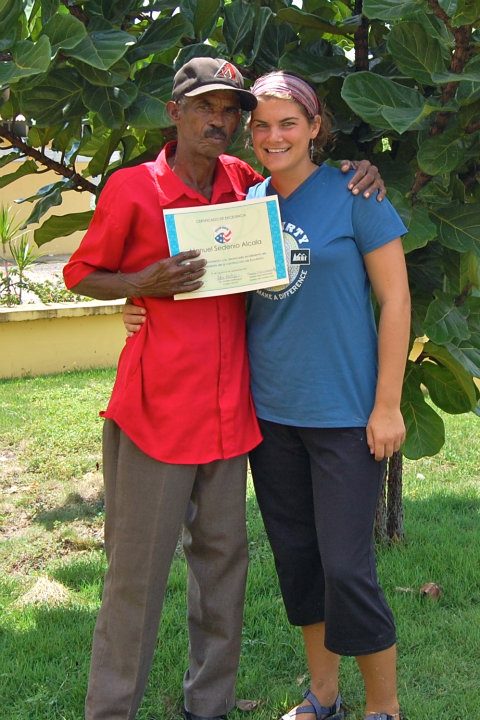Location
Isla Saona, Altagracia Province, Dominican Republic
Community Description
The island of Saona is located off the South East point of the Dominican Republic. The island is a part of the Dominican Republic National Park system, Parque National del Este.
Mano Juan, located one hour by boat from the port of Bayahibe, is the larger of two coastal communities located on the island. It has a population is 230 people, 28% of whom are youth under the age of 18.
People living in Mano Juan are financially dependent on the tourism industry, with a minority depending on fisheries.
Mano Juan does not have a potable water system. Therefore, individual homes collect rainwater, which they chlorinate and use for drinking.
Over half of the families in Mano Juan lack a sanitation facility, and the residents utilize the beach or forest for their needs, thus creating environmental and health problems.
The Mano Juan Primary School is located in the community, and teaches through the 8th grade.
Project Description
This project is to construct two EcoBaños (ecological bathrooms or composting latrines) at the school.
The Pro Desarrollo Comunitario de Mano Juan committee, with assistance from the Peace Corps environmental volunteer, has planned this as a pilot project. The ultimate goal is for every house in Mano Juan to have a proper sanitation facility within the next 2 years.
The design provides for the capture of the waste above the ground, thus eliminating the possibility that the groundwater will be polluted.
The cement double-vault latrines will be constructed of steel-reinforced concrete. The concrete is made by mixing cement, sand, and gravel.
The “toilet” portion is made from a specific mold that allows for the separation of the urine and fecal matter. Urine exits through a tube, and the fecal material is left to dry. The composted material can then be safely removed and used as fertilizer.
The base has two compartments. The first compartment will be used until full, an average of 6 months. That compartment will then be capped, and the second compartment will be used.
Trained Health Promoters will visit the school and cover different topics ranging from health risks to parts of the latrine. A local mason has attended an EcoBaño training, and will construct the latrines, with construction time projected to be 2 ½ weeks.
Community participation includes manual labor volunteers for every work day for 7 days, and breakfast and lunch for the laborers. Transportation from port to island has been donated by the local Ministry of Environment office.
Community members will transport materials from the community dock to the storage location at the school. The community solicited the donation of materials, including the zinc needed for the structure.
Student groups have raised funds through various community events to buy paint, with which students will paint an educational mural upon completion of project.
 Project funds will be used to buy the remaining materials. In addition, they will pay for the labor of the mason and some transport costs.
Project funds will be used to buy the remaining materials. In addition, they will pay for the labor of the mason and some transport costs.
The Health Promoter will continue with education during and after the construction to ensure that the latrine is maintained properly.
Project Impact
230 people will benefit from the project.
Peace Corps Volunteer Directing Project
Colleen Ferris
Comments
The project will provide appropriate sanitation facilities for the school, and also serve as an educational and motivational tool to demonstrate the composting latrine technology for proper waste management.
Dollar Amount of Project
$555.00
Donations Collected to Date
$555.00
Dollar Amount Needed
$0.00 – This project was fully funded through the generosity of the Elmo Foundation together friends and family of Peace Corps Volunteers Colleen Ferris. The project became infeasible, and the project was cancelled, with no expenditure of funds. The funds have been allocated for other projects in the Dominican Republic.